Reviews
Louis Malle
USA, 1984
Credits
Review by Lindsay Peters
Posted on 30 November 2010
Source MCA Home Video VHS
Categories Malle Entendu: The Ecstatic, Eclectic Cinema of Louis Malle
A San Francisco pawnshop heist movie with Donald Sutherland, Wallace Shawn, and a post-Spicoli Sean Penn. How could a film with a synopsis like this not be a great time?
And yet Crackers is an overflowing, underdone footnote in the history of the comedic heist film. Sutherland is cast as a disgruntled pawnshop security guard who leads a ragtag group of down and out petty criminals on a quest to crack the pawnshop safe while unscrupulous proprietor Garvey, visits his mother. Wallace Shawn is Turtle, Sutherland’s docile sidekick, who is more preoccupied with gorging himself on whatever meal he can find than the heist at hand. Don Dillard (Sean Penn, sporting a truly heinous Southern accent) is more focused on securing the affections of Ramon’s elusive sister, Maria. Larry Riley rounds out the group as a pimp named Boardwalk with a baby constantly on his leopard-printed hip. Distraction, in short, is the state of mind which best summarizes Crackers.
The film is a loosely adapted remake of Mario Monicelli’s 1958 heist satire, Big Deal on Madonna Street, which would later spawn the inoffensive 2002 Clooney-Soderbergh production, Welcome to Collinwood. It makes sense that Malle would have been a logical choice to helm such a project for Universal—early in his career, Malle had proven to be more than capable of telling farcical tales, and Atlantic City, released four years prior, also centers on a collection of misfits and malcontents tied together by a specific locale. However, Crackers shows none of the cinematic inventiveness and frenetic spirit of Zazie dans le métro and replaces the romanticized desperation of Atlantic City with sparsely drawn characters who make jokes like the following:
BOARDWALK:
Say, Mr. Fix-it, can’t you keep that bitch in line?GARVEY:
I told you, don’t call her a bitch.BOARDWALK: Lighten up, Fix-it, bitch don’t mean nothing. Call my old lady that. Call them all that. [to hooker, passing by] Hey, bitch! [to Garvey] See?
Everything begins promisingly enough with a series of shots showing the Tenderloin district from the perspective of a meter-maid vehicle. With cinematographer László Kovács, Malle proceeds to set up a variety of well-composed scenes to deftly introduce each character into the story. As the film progresses, however, attempts at character development fail to do much in the way of characterization. Sutherland ambles through the film in a state of underlying disinterest, save for a scene which calls for him to meticulously blow dry his hair after a roleplaying session with Christine Baranski’s sex-crazed meter maid. A sole scene is given to Shawn in a half-hearted attempt to lend some sense of depth to his morosely gluttonous character. More attention is given to the comparatively energetic yet ultimately dispensable Baranski, whose final appearance in the film comes in the form of a strangely refined striptease set to the Nutcracker—Baranski’s suggestive arabesques effectively distort many a childhood memory of the Sugarplum Fairy.
The writer behind Crackers should have taken advice from Marcello Mastroianni in Big Deal on Madonna Street: “stealing is a serious profession. It takes serious people, not people like you.” The best farcical heist movies recognize this—films like Topkapi and A Fish Called Wanda contain intricately executed schemes, even if they’re performed by characters open to comedic ridicule. Crackers, in contrast, expects too little of its audience in terms of humor and too much in terms of the limited screentime given to the heist itself. After a series of promptly dismissed obstacles - including accidentally drilling into a water pipe and breaking down a wall only to find a kitchen instead of the pawnshop - the thieves finally make it to the safe, only to be caught in the act by a returning Garvey, home early and grieving for his just-deceased mother. Friendship becomes the awkwardly sentimental message of the film when Garvey lets everyone off the hook, revealing that the safe was empty all along.
One final point of contention: the film’s music further positions Crackers as a singularly inexplicable anomaly in Malle’s career. For the man who hired Miles Davis to score his first film, to open (and close!) Crackers with a Michael McDonald song is perplexing, particularly when Big Deal on Madonna Street contains its own irresistibly energetic jazz score. And Crackers becomes all the more disappointing in the larger context of Malle’s career timeline—it was the film to follow My Dinner With Andre, making Crackers an unexpectedly unfortunate byproduct of Malle’s chameleonic tendencies. Thankfully, this affinity for wildly divergent stylistic experiments also means that Malle’s next projects would soon eclipse this ill-conceived misfire.
More Malle Entendu: The Ecstatic, Eclectic Cinema of Louis Malle
-
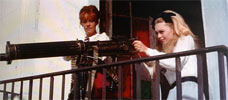
Viva Maria!
1965 -
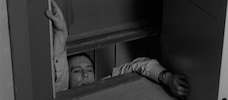
Elevator to the Gallows
1957 -

Zazie dans le métro
1960 -
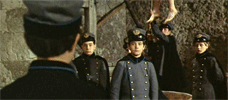
William Wilson
1968 -

Black Moon
1975 -

Lacombe, Lucien
1974 -

Atlantic City
1980 -
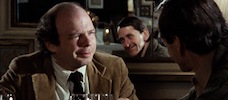
My Dinner with Andre
1981 -
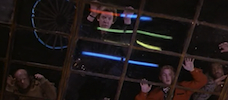
Crackers
1984 -
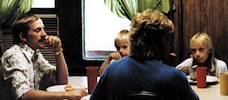
God’s Country
1985 -

Vanya on 42nd Street
1994
We don’t do comments anymore, but you may contact us here or find us on Twitter or Facebook.



